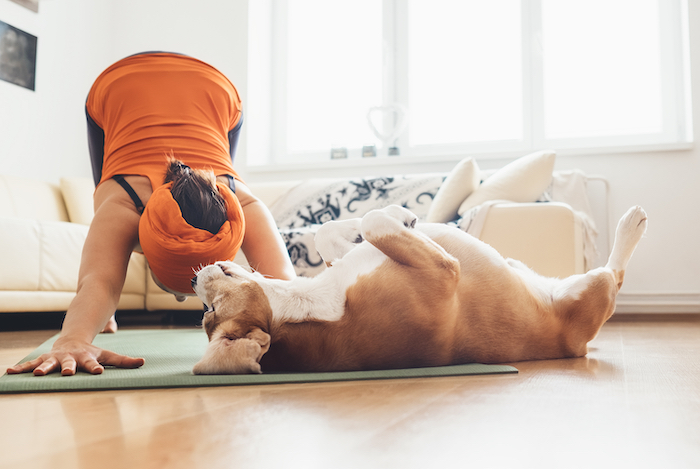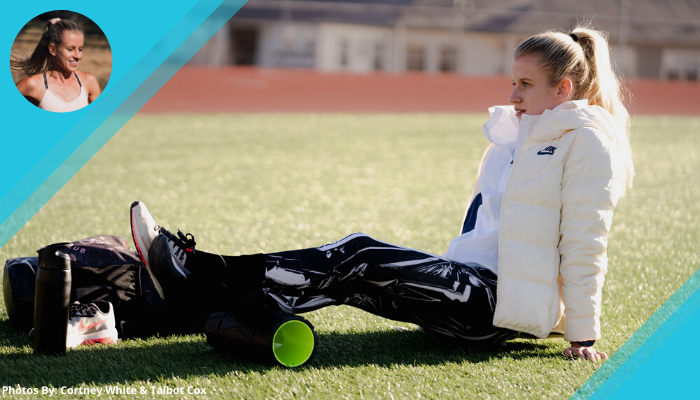The Perfect Post-Workout Plan...Pets


By: Recover-Zone Team
Our amazing team consist of a wide variety of writers, from novice athletes, to serious competitors. Competing in an array of fitness challenges.
Pets…recovery…what? Let’s start with the basics. It is a well-known paradox that in order to be better you have to be worse. What do I mean? In its simplest form, the primary equation for training is ”stress + rest = growth”. For example, when you go to the gym and do squats on a biological level you are breaking down your muscles. When you finally drag your legs from the car to your house and make it to the coach something starts to happen. Your legs are recovering. As you take your time and give your body rest your muscles respond by building bigger and stronger preparing you for your next stunt at the fitness center. What makes things interesting although, is when you add pets into the equation.
When stress is a Good Thing
First, let’s dive a little deeper into the infamous word stress! You might think that such an all too common part of your life is well-researched and it is. What is changing though is the landscape behind how stress affects performance and what types of stress are considered factors. In the past, most of the stress research focused primarily on the role of physiological stress and how it played its role in adaption to training. This is the basics of the training lesson that we covered earlier. Stressors like running three miles or lifting weights all throw your body into what is called a catabolic state or breakdown state. The opposite is an anabolic state aka a building state which is obtained from rest. As research has developed a gradual shift of focus is now touting the crucial impact that psychological stress plays. This usually comes in forms that most people would choose to do without. Driving in a traffic jam, caring for a sick family member, or any plethora of activities that give you painful headaches. Findings that have been surfacing indicate an interesting correlation with how your body deals with both forms of physical and mental stress. Exactly the same! Whether you go to the gym and hit up a 30-minute hot yoga class or spend 30 stressful minutes in the grocery store does not necessarily matter. The effects they stimulate are matching in your bodies sense, not to say that they might result in different levels of impact on you athletically.
It is necessary to clarify that turning in a paper late to work is not going to build up the same amount of stress compared to if you swam for an hour. On a similar note, it would be much less desirable to turn in your paper late considering you are not challenging any physical attribute of your body and therefore will see no gain in fitness resulting from the adaption of muscles. These effects are even trickling down to collegiate and youth sports. A study from the Journal of Strength and Conditioning showed that D-1 football players were more likely to suffer injury in times of high academic stress. Respectively parents are now starting to push their kids to treat little league games like the World Series. A definite addition of stress.
Good Stress…Bad Stress
How does this all tie into your training? Stress is essential to promote adaption, this is what many are coining “good stress”. However, rest is also essential. What is beginning to happen in our push hard society is low forms of constant stress allowing no time to recover from training this is called chronic stress aka “bad stress”. If you rush to the gym from a stressful day at work and go home to clean and do chores the response to your training will be significantly less than if you allowed your body to relax. A study in the Journal of Frontiers of Physiology showed significant differences in positive adaption for healthy females who rated themselves with low levels of stress compared to their more stressful less benefiting counterparts. Low stressors add up and even stress not directly related to your training has its part in the regime. The key focal point for this area of our training is differentiating between “good stress” and promoting more of it while eliminating “bad stress”. The good news that you have been waiting for is yes, pets can help.
74% of Pet Owners Report a Mental Health Improvement – ADAA
Good Stress…Bad Stress
How does this all tie into your training? Stress is essential to promote adaption, this is what many are coining “good stress”. However, rest is also essential. What is beginning to happen in our push hard society is low forms of constant stress allowing no time to recover from training this is called chronic stress aka “bad stress”. If you rush to the gym from a stressful day at work and go home to clean and do chores the response to your training will be significantly less than if you allowed your body to relax. A study in the Journal of Frontiers of Physiology showed significant differences in positive adaption for healthy females who rated themselves with low levels of stress compared to their more stressful less benefiting counterparts. Low stressors add up and even stress not directly related to your training has its part in the regime. The key focal point for this area of our training is differentiating between “good stress” and promoting more of it while eliminating “bad stress”. The good news that you have been waiting for is yes, pets can help.
The Pets Recovery Solution
The reasoning behind the phenomenon that pets promote workout recovery is quite simple, people love pets and pets lower feelings of stress. Not too complicated, and there is research to back it up. A study in the Journal of Personality and Social Psychology showed that physiological reactivity, in other words, the body’s response to stressors, was lower in test subjects performing a stressful task when accompanied by a pet. Another study found that simply the presence of a dog in a work environment lowered the stress of employees. If you’re not convinced yet again a further study showed that pets were more effective in lowing blood pressure and heart rate during stressful activities than a pharmaceutical drug. Pets are the magic medicine!
More than Just Mood
The research on stress and pets is profound but another piece of the puzzle is not too far behind and that is mood. A major plague that has faced sports performance from the dawn of professional sports is the question, how much should I train? As marketers have begun to become craftier with their ploys it is easy to see the obvious desire for a solution. Whether it is your bed telling you how your recovering and whether to choose between a hard day and easy day or your fitness watch, most if not all tests really on quantifiable tests. Much like stress research, at least in some segments of development heads are turning in a new direction, mood. Something that has been relative unquantifiable in the past, but is now open to researchers who have adjusted by using the POMS or profile of mood questionnaire. How did this come to be? A quite convincing ten-year study published in the British Journal of Sports Medicine showing a dose-response relationship with increases in mood disturbances and increased training stimulus. Basically the more the swimmers trained the less positive their mood was. The authors concluding that mood could be an indicator of determining training adjustments. Research from a similar study on elite kayakers showed the same dose-response relationship with poor performance and poor mood. Through this research, it has now been concluded by researchers that positive mental health is synonymous with successful athletic performance.
"Psychological and emotional relaxation is rarely prescribed with the same degree of precision that training is, but it should be...sometimes the prescription is as simple as go outside and walk your dog."
Mood Magic
Now on to the good stuff. You guessed it pets have been shown to increase mood. The practical effects are quite easy to explain. A dog waiting to see you or a cat purring in your lap is satisfying. A study done on college students showed a preference for pets at workplaces for improved mood. The nuances in this one can extend farther. What also is required of pets owners is walks, and walking your pet might just be what you need. It has been shown that spending 30 minutes in nature can improve mood. A two-for-one deal plus if you include social interaction which also has shown positive effects on mood, pets seem to answer all the questions. Happier, more positive, clearer mind, something that might seem obvious to pet owners but now you have the research to prove it. Add to that an excuse to play with your pet and you have a winning combo.
Train Hard Stay Healthy
The final area we will touch on is overall health and wellness. It is not too difficult to see the negative effects sickness plays on anybody’s training, and whether you are a stick-it-out, train while your sick, type of person or the opposite, research is fairly conclusive. A reoccurring theme seems to show directly following exercise your immune system is weakened as your body spends its energy repairing the damage done. After having time to adapt your body shows an amazing effect, your immune system becomes stronger. This can possibly be traced back to the phenomena we have already covered, you must break down to build up. This in and of itself is an entirely different issue however in comparison to training while sick. After coming down with the flu or whatever virus is plaguing you causing a fever, your body is facing stress. When you add the stress from a workout on top of that you are not doing your body any favors. Although researchers do conclude symptoms, neck up are fine to train with, just please don’t do anything that will make others sick. All this to say whether train sick or not, you defiantly are not going to be able to give it your best effort or experience the positive effects of training on the same level. One related study in the Journal of Sports Medicine, Training and Rehabilitation showed that training with an acute viral infection was one reason to cause what is called chronic fatigue syndrome. Which like its sounds frequently ruins the careers of many athletes.
Happy Healthy
Once more pets to the rescue. This specific benefit of pet ownership might not quite be as well pronounced or appraised by the pet lovers community but still has significant reasoning to back it up. As we just covered if you are sick training is not going to be at its best, if pets can help you from becoming sick then that’s a win. A study in the Journal of the Royal Society of Medicine clearly showed pet owners reporting significantly lower minor health issues in comparison to the no-pet owners control group. Add to that a pilot study that showed pets decreased the frequency of illness and yep that’s pets for you.
Post-Workout Pet Tips
Now its time for some practical tips you can apply to accrued the most from your post-workout pet pal! First, you need to choose the right pet. Obviously, if you are a dog person and your aunt gives you a cat, rather than achieving the positive effects you might see the contrary. Having to shop for cat food, clean the litter, and feeling annoyance every time you see the animal would not help lower stress and improve mood. This point is rather a given but, buy a pet type you like. Another factor to consider is time. If you are busy most the week, don’t have time to feed or walk your friend, or will stress about buying food do not get a pet. Choosing the right type of pet is highly personal to your situation. If all you can handle is a gold-fish, and you love gold-fish, well, nothing is stopping you from getting a goldfish. On a similar yet differing note one possibility for recovery is taking your pet for a walk. As we have already covered the benefits walks have on increasing your mood walks can also offer a great postworkout recovery option. Active recovery has been shown in multiple studies to benefit recovery. A postworkout walk might be just what you and your pet need to get the most from your workout.
Wrapping everything together, most people don’t need research to buy a pet. Most people would keep their pet even it harmed their recovery. Most people don’t even buy pets for their recovery. Now the research is showing that for most people pets might be the next best thing for your recovery.
Get the most from all your
Want More Great Content...
Support Us for Free:
What’s up fitness fam! You might have noticed links on our website for various products. We wanted to let you know that we do this to keep our website ads-free. Obviously, nobody likes the pesky clutter of ads so instead, we simply put links to related products so that you don’t have to go searching if you want to buy something related to the post you are reading. As you probably guessed, yes we do get a commission if you buy something through our link, but here is the great news, it does not cost you any more! That means you can buy things you already wanted, support our business for free, and not have to deal with annoying ads! It’s a win, win, win! (If you really want to help us out you can use our link whenever you shop Amazon by clicking here and bookmarking the page.) If you would like to read all the technical mumbo-jumbo behind our links you can click here.



